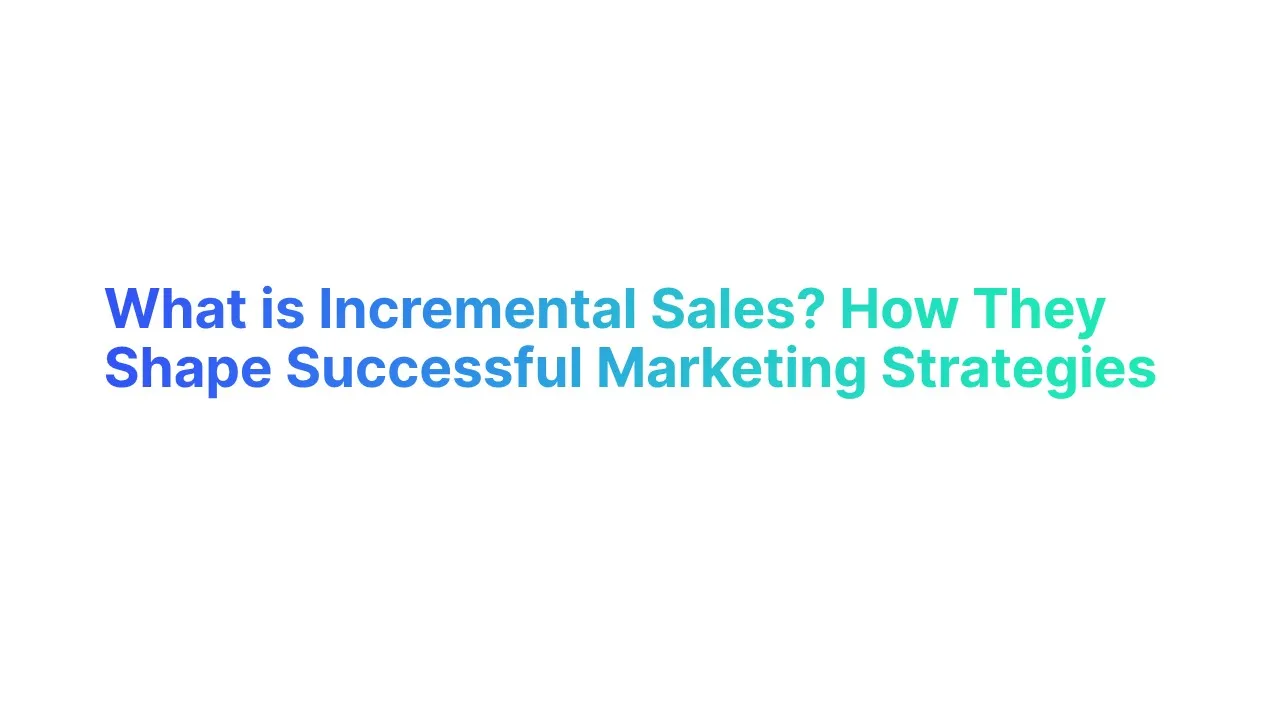Introduction to Incremental Sales

What Are Incremental Sales?
Incremental sales refer to the additional revenue generated as a direct result of specific marketing campaigns or business strategies.
These sales are not part of the regular sales pattern and can be traced back to particular actions or investments, such as promotional activities or a new advertising strategy.
Incremental sales are a crucial KPI (Key Performance Indicator) for assessing the direct impact of sales and marketing strategies on revenue growth.
Incremental Sales Example
To illustrate, consider a company that launched a two-week online ad campaign:
- Pre-campaign sales: $50,000 weekly
- During campaign sales: $70,000 weekly
- Incremental sales: $70,000 - $50,000 = $20,000 weekly incremental revenue
This example highlights how targeted marketing efforts can lead to measurable increases in sales, allowing companies to gauge the actual sales impact of specific marketing campaigns.
Importance of Measuring Incremental Sales
Measuring incremental sales is vital for businesses to understand the effectiveness of their marketing investments. It helps in making informed decisions about where to allocate resources for maximum return.
- Resource Allocation: By identifying which strategies yield the highest incremental sales, businesses can optimize their marketing spend, focusing more on profitable activities.
- ROI Analysis: Incremental sales provide concrete data to calculate the return on investment (ROI) for different marketing strategies, ensuring financial accountability.
- Strategic Adjustments: With precise measurement, companies can quickly pivot or adjust strategies that are not performing as expected, enhancing overall marketing effectiveness.
How to Measure Incremental Sales

Measuring incremental sales involves identifying the additional revenue generated directly by specific marketing actions or business strategies, distinguishing it from your baseline or expected sales. Here's how you can effectively measure incremental sales:
- Establish a Baseline: Determine the average sales performance before the implementation of the specific marketing campaign or strategy. This serves as your control data.
- Implement the Strategy: Roll out the campaign or strategy intended to boost sales, ensuring it is the only variable affecting sales during this period to maintain the accuracy of the data.
- Record the Sales During the Campaign: Track the sales figures while the campaign or strategy is active. This data represents the potential impact of your marketing effort.
- Calculate the Difference: Subtract the baseline sales from the sales recorded during the campaign to find the incremental sales. This figure represents the direct impact of your marketing efforts.
Incremental Sales Formula
To put the measurement process into a formulaic perspective, the incremental sales can be calculated using the following simple formula:
Incremental Sales=Total Sales during Campaign−Baseline Sales
Example Calculation:
- Baseline Sales: $5,000 per week
- Sales during Campaign: $6,500 per week
- Incremental Sales: $6,500 - $5,000 = $1,500
This $1,500 represents the incremental sales attributed to the campaign.
Additional Considerations
- Adjust for Seasonality and Market Changes: Ensure that the baseline reflects a normal operating period that is comparable to the campaign period. Adjust for any seasonality or market fluctuations that might skew the results.
- Use of Control Groups: If possible, use a control group or market where the campaign isn't run to further validate that any sales lift is truly incremental and not influenced by external factors.
- Long-Term Tracking: Monitor sales post-campaign to assess the long-term impact and ensure that the incremental sales are not just shifting sales from one period to another (a phenomenon known as sales cannibalization)
Factors Affecting Incremental Sales

Incremental sales are influenced by a myriad of factors that can either enhance or hinder the effectiveness of marketing campaigns and sales strategies. Understanding these factors is crucial for accurately forecasting and maximizing incremental sales. Here's a breakdown:
Market Conditions
- Economic Climate: Economic downturns or booms can significantly impact consumer purchasing power, thereby affecting incremental sales.
- Competition: Increased competition can dilute the impact of promotional campaigns, while less competition can enhance it.
- Market Saturation: In a saturated market, incremental sales may be harder to achieve as most potential customers already have similar products or services.
Consumer Behavior
- Changing Preferences: Shifts in consumer preferences can render a previously effective marketing strategy less impactful.
- Brand Loyalty: Strong loyalty can make it difficult to attract new customers from competitors, potentially reducing incremental sales from new market segments.
- Price Sensitivity: The degree to which price changes influence buyer choices can affect the success of price-based promotions.
Marketing Strategy
- Campaign Reach and Quality: The broader and more targeted the reach of a campaign, the higher the potential incremental sales. The quality of the campaign content also plays a significant role.
- Promotional Offers: The attractiveness of offers (discounts, bundles, etc.) can significantly influence the incremental sales. More compelling offers tend to generate higher incremental sales.
- Channel Effectiveness: The choice of marketing channels (digital vs. traditional, social media platforms, etc.) impacts the campaign's effectiveness and its resultant incremental sales.
Product Factors
- Product Differentiation: Highly differentiated products may see higher incremental sales due to reduced direct competition.
- Product Life Cycle Stage: Products in the introduction or growth stages might see higher incremental sales compared to those in the maturity or decline stages.
External Factors
- Regulatory Changes: New regulations can impact the viability of certain marketing tactics or product offerings, influencing incremental sales.
- Technological Advancements: Adoption of new technologies can enhance the effectiveness of marketing campaigns, thus boosting incremental sales.
Best Practices for Maximizing Incremental Sales

To effectively maximize incremental sales, businesses need to adopt specific strategies that go beyond merely understanding influencing factors. Here are some focused best practices designed to directly boost incremental sales:
1. Integrate Data Analytics
Leverage Data: Use advanced data analytics to calculate incremental sales and uncover insights into customer behaviors, preferences, and patterns. Employ these insights to predict future purchasing behaviors and tailor campaigns accordingly.
A/B Testing: Regularly perform A/B testing on different aspects of marketing campaigns to identify the most effective elements that could be optimized for better performance.
2. Enhance Customer Engagement
Personalization: Implement personalized marketing techniques to make the target audience feel uniquely valued. Use customer data to tailor communications, offers, and product recommendations.
Customer Journey Optimization: Map out customer journeys and identify key touchpoints for engagement. Optimize these touchpoints to enhance the overall customer experience and drive incremental sales.
3. Leverage Technology
Automation Tools: Utilize marketing automation tools to deliver timely and relevant content to potential customers. Automation can help maintain engagement without additional manual effort, increasing the efficiency of campaigns.
CRM Systems: Employ robust customer relationship management (CRM) systems to manage interactions with current and potential customers, streamline processes, and improve profitability.
4. Develop Strategic Partnerships
Collaborations: Form partnerships with other businesses that offer complementary products or services. This can open up new customer bases and provide additional value to existing customers.
Co-marketing Campaigns: Engage in co-marketing efforts to leverage the marketing power and customer trust of allied organizations.
5. Continuous Product Improvement
Innovation: Keep refining and improving the product offerings based on customer feedback and emerging marketing trends. Innovative products can drive interest and create reasons for customers to make additional purchases.
Quality Assurance: Maintain high product quality to ensure customer satisfaction, leading to repeat business and word-of-mouth recommendations, which are critical for incremental sales.
6. Optimize Pricing Strategy
Dynamic Pricing: Adopt dynamic pricing strategies where prices are adjusted based on real-time market demand, competition, and other external factors. This can help capture maximum value and increase sales.
Promotional Tactics: Plan strategic promotions during key times to attract more customers and encourage purchases. Ensure these are well-timed and relevant to consumer needs.
7. Strengthen Sales Force Efficiency
Training and Development: Continuously train the sales and marketing teams with the latest sales techniques and product knowledge to enhance their effectiveness.
Incentive Programs: Implement incentive programs to motivate the sales team to exceed their sales targets, directly impacting incremental sales.
8. Monitor and Refine Sales Metrics
Sales Process and Metrics: Regularly review and refine the sales process using key incremental sales metrics to ensure efficiency and effectiveness in driving sales.
How Can Incremental Sales Shape Your Marketing Efforts for Success
Incremental sales, the additional revenue generated from specific marketing efforts, are a powerful tool for shaping and optimizing marketing strategies.
Here’s how focusing on incremental sales can drive your marketing efforts towards greater success:
Aligning Marketing Objectives with Business Goals
Targeted Campaigns: By focusing on incremental sales, marketing teams can design campaigns that are directly aligned with specific business objectives, such as entering new markets or promoting new products. This alignment ensures that every marketing effort contributes directly to the overarching goals of the company.
Performance Metrics: Incremental sales provide a clear, quantifiable metric to gauge the effectiveness of different marketing strategies. This data-driven approach helps in fine-tuning marketing efforts to maximize ROI.
Optimizing Budget Allocation
Resource Optimization: By measuring the incremental sales generated from various marketing channels and campaigns, companies can identify the most cost-effective strategies. This insight allows for smarter allocation of marketing budgets, prioritizing activities that offer the best return on investment.
Cost Efficiency: Understanding which strategies lead to higher incremental sales can also help in cutting costs on less effective methods, thus optimizing spending and resource use across the board.
Enhancing Customer Insights
Customer Behavior Analysis: Tracking incremental sales helps in understanding customer response to different marketing tactics. This knowledge aids in crafting campaigns that resonate more effectively with target audiences, based on their purchasing behaviors and preferences.
Segmentation and Targeting: Detailed insights from incremental sales data allow marketers to segment their audience more accurately and tailor marketing messages to meet the specific needs and desires of different groups.
Facilitating Continuous Improvement
Feedback Loop: Incremental sales act as a feedback mechanism, providing immediate insights into the effectiveness of marketing campaigns. This ongoing feedback is crucial for continuous improvement, allowing marketers to quickly adapt and optimize ongoing and future campaigns.
Innovation Trigger: Regular analysis of incremental sales can also spark innovation within the marketing team, encouraging the exploration of new strategies and technologies to enhance campaign effectiveness.
Building Competitive Advantage
Market Adaptability: In fast-paced markets, the ability to swiftly adjust marketing strategies based on concrete sales outcomes is a significant competitive advantage. Incremental sales data facilitates rapid adaptability to market changes, consumer trends, and competitive actions.
Proactive Marketing: Instead of reactive adjustments, incremental sales enable proactive marketing planning. This forward-thinking approach anticipates changes and customer needs, setting the stage for more strategic marketing maneuvers that align with future market conditions.
Concluding Insights on Enhancing Marketing Campaigns with Incremental Sales
As we've explored throughout this article, focusing on the incremental sales metric offers profound advantages for refining and optimizing marketing strategies. By utilizing this metric, companies can directly link their marketing efforts to tangible revenue increases, providing a clear and measurable impact of specific campaigns.
This approach not only aids in aligning marketing objectives with broader business goals but also enhances the precision in budget allocation and strategic planning. With incremental sales as a key performance indicator, businesses are better equipped to make data-driven decisions, ensuring that each marketing initiative is both cost-effective and impactful. This strategic focus ultimately leads to sustained growth and a competitive edge in the market, demonstrating the undeniable value of integrating incremental sales metrics into your marketing analysis and planning.








